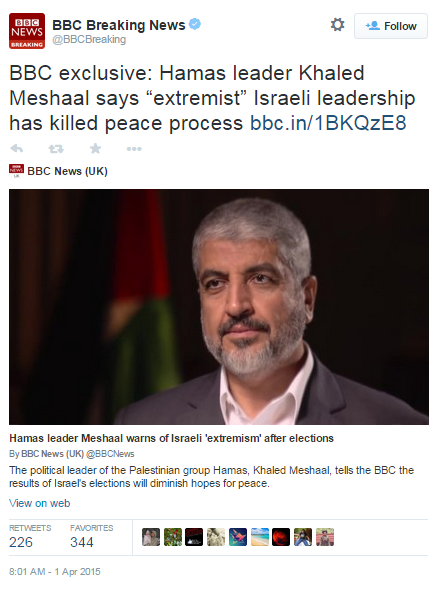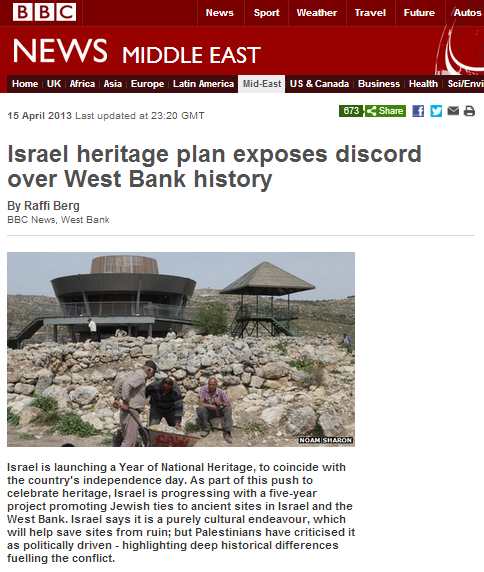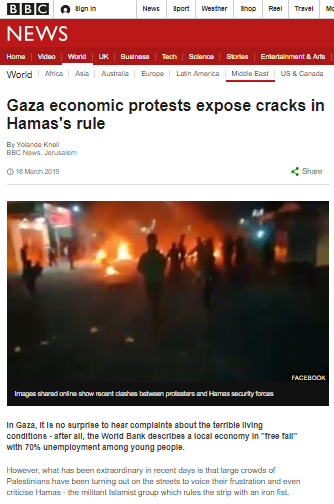On July 17th a report titled “Israel suspends fuel deliveries to Gaza over arson attacks” appeared on the BBC News website’s Middle East page. The article opened with a reasonable account of the story: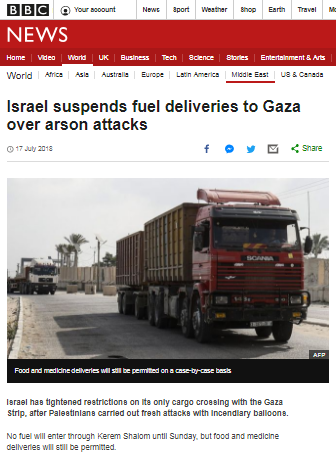
“Israel has tightened restrictions on its only cargo crossing with the Gaza Strip, after Palestinians carried out fresh attacks with incendiary balloons.
No fuel will enter through Kerem Shalom until Sunday, but food and medicine deliveries will still be permitted. [emphasis added]
Israeli Defence Minister Avigdor Lieberman said it was responding to “continued terror attempts” by the Palestinian Islamist movement Hamas.”
The report also gave readers a reasonable account of the hostilities that took place on July 14th.
“On Saturday, the Israeli military carried out waves of air strikes across the coastal territory in response to some of the most intensive bombardments from Gaza since the 2014 war between Israel and Hamas.
Two Palestinians were killed and 14 others wounded in the Israeli strikes, while four Israelis were wounded when more than 200 rockets and mortars were fired towards southern Israel.
The violence subsided after Hamas and Islamic Jihad militants agreed to a ceasefire brokered by Egypt.”
As was the case when previous restrictions were announced a week before, the BBC presented lower figures for the area of land (7,500 acres) destroyed in Palestinian arson attacks and the monetary value ($2 million) of that damage than is actually the case.
“Israeli Prime Minister Benjamin Netanyahu said he was prepared to “increase the force of our attacks” if Palestinians did not stop launching kites and balloons carrying containers of burning fuel and explosive devices over the Gaza-Israel border.
The devices have sparked hundreds fires in southern Israel, burning more than 2,830 hectares (7,000 acres) of forest and farmland and causing hundreds of thousands of dollars of damage, officials say.”
Readers found the BBC’s now standard anodyne portrayal of the ‘Great Return March’ agitprop which continues to conceal from audiences the fact that the casualty figures quoted actually come from Hamas – which organised, facilitated and financed the publicity stunt – and that over 80% of those killed have been shown to have links to various terror factions, as well as giving context-free amplification to the ‘right of return’ claim.
“The arson attacks began during mass demonstrations along the border, at which thousands of Palestinians have expressed their support for the declared right of Palestinian refugees to return to their ancestral homes in what is now Israel and also demanded an end to the blockade of Gaza imposed by Israel and Egypt.
Gaza health officials say more than 130 Palestinians have been killed and 15,000 others injured by Israeli forces during the protests.”
The most notable aspect of this report, however, is the BBC’s decision to highlight comment on the story from two sources.
Firstly, the BBC found it appropriate to amplify parts of a statement from the spokesman of a terrorist organisation.
“Hamas, which dominates Gaza, warned Israel of “dangerous consequences”. […]
A Hamas spokesman called the closure a “crime against humanity”.
“These vengeful measures reflect the degree of the oppression and the ugliness of the crime that Gaza is facing, that will have dangerous consequences for which the occupation will bear full responsibility,” Fawzi Barhoum said.”
Barhoum also stated that:
“The Israeli occupation’s closure of the Kerem Shalom crossing and depriving Gaza from the most simple necessities of life is a crime against humanity that will be added to its list of crimes at the expense of the Palestinian people including those living in the Strip”
BBC audiences were not however told that in May, the terror organisation now once again claiming a “crime against humanity” directed three separate attacks against the Kerem Shalom crossing, damaging the same fuel supplies which it now calls “the most simple necessities of life”. Neither were they informed of the related issue of Hamas’ cynical exploitation of fuel imported via the Rafah crossing.
“Approximately 30 million liters of diesel fuel, supposedly intended for Gaza’s power station, have been brought in since the beginning of the year. Hamas buys the diesel fuel from Egypt, but instead of using it all to fuel the station and produce more hours of electricity per day, it has been using some of the diesel fuel to make a profit.
Of the 30 million liters, 17.8 million were taken to Gaza’s power station. Another 12.2 million liters were either sold on the black market to those willing to pay the maximum price for it, or diverted for Hamas’s military purposes. Hamas makes a profit of NIS 2.5 on every liter of diesel fuel sold in Gaza.”
The second comment on the story promoted to BBC audiences came from a foreign funded political NGO – with a link to its Twitter account.
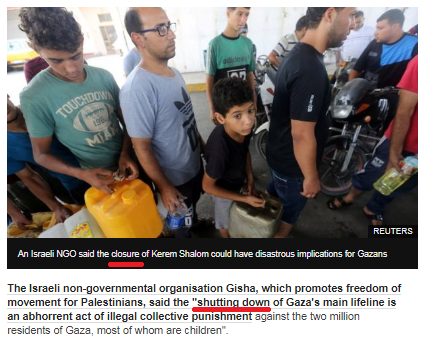
As the BBC correctly reported at the beginning of the article – there is no “closure” of the Kerem Shalom crossing and “Gaza’s main lifeline” has not been ‘shut down’. It is therefore significant that the BBC chose to amplify those inaccurate claims despite obviously knowing that they are false.
BBC editorial guidelines on impartiality require that audiences be informed of the “particular viewpoint” of contributors. In the case of ‘Gisha’, it would obviously be helpful to BBC audiences to know that the political NGO touting the claim of “illegal collective punishment” petitioned Israel’s Supreme Court in April, claiming that Israel’s responses to the ‘Great Return March’ violence along the Gaza border are illegal and demanding that the Court prohibit the use of live ammunition by the IDF. The court rejected that petition.
The BBC’s public purposes oblige it to “provide accurate and impartial news […] of the highest editorial standards so that all audiences can engage fully with issues across the UK and the world”. Apparently BBC News website editors are of the opinion that the amplification of baseless propaganda slogans such as “crime against humanity” from a terror faction and “illegal collective punishment” from a political NGO which claims to represent the interests of “Gaza residents” that have burned thousands of acres of farmland, woodland and nature reserves in three months of terror attacks, contributes to audience understanding of this story.
Related Articles:
After three months, BBC News website notices Gaza arson attacks
BBC WS audiences get distorted account of Kerem Shalom closure

